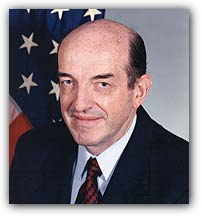FCC Commissioner: Blocking Local Broadband Authority "'Exactly The Wrong Way to Go"
FCC Commissioner Copps spoke at the SEATOA Conference in Asheville, North Carolina, on Tuesday. He went out of his way to condemn legislation that would preempt the authority of local governments to build broadband networks, echoing a similar statement from his colleague, Commissioner Clyburn.
But he started with a discussion about the importance of broadband access to the Internet:
 We strongly support his comments, while emphasizing that an incumbent that simply provides DSL or cable services must not be construed as necessarily serving the broadband needs of communities.
We strongly support his comments, while emphasizing that an incumbent that simply provides DSL or cable services must not be construed as necessarily serving the broadband needs of communities.
Getting broadband out to all our citizens is not just something that would be nice for us to do. It is something essential for us to do if we want to provide individuals the opportunity to live productive and fulfilling lives in the Twenty-first century and something equally imperative if we want our country to have a competitive edge in this challenging world.But he moved on to highlight the importance of communities having the right to build their own networks, should they deem it necessary:
When incumbent providers cannot serve the broadband needs of some localities, local governments should be allowed--no, encouraged--to step up to the plate and ensure that their citizens are not left on the wrong side of the great divide. So it is regrettable that some states are considering, and even passing, legislation that could hinder local solutions to bring the benefits of broadband to their communities. It's exactly the wrong way to go. In this context, too, our previous infrastructure challenges must be the guide. The successful history of rural electrification, as one example, is due in no small part to municipal electric cooperatives that lit up corners of this country where investor-owned utilities had little incentive to go. Those coops turned on the lights for a lot of people! You know, our country would be a lot better off if we would learn from our past rather than try to defy or deny it.
 We strongly support his comments, while emphasizing that an incumbent that simply provides DSL or cable services must not be construed as necessarily serving the broadband needs of communities.
We strongly support his comments, while emphasizing that an incumbent that simply provides DSL or cable services must not be construed as necessarily serving the broadband needs of communities.


